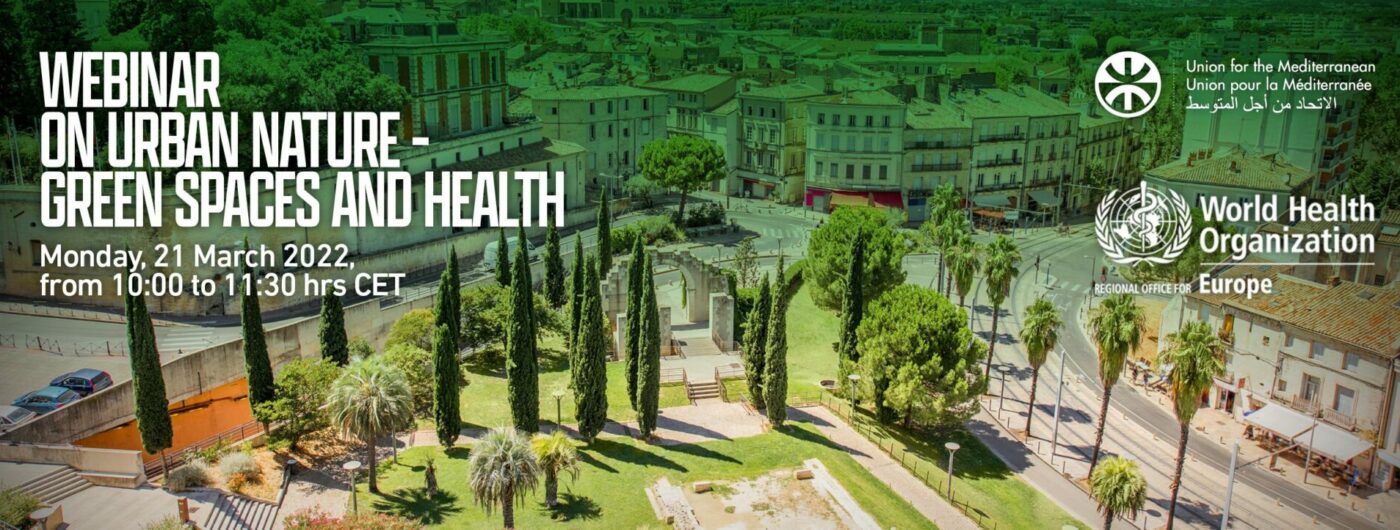
Towards more liveable and healthy cities: UfM addresses the positive impacts of urban green spaces on health
21 March 2022. Urban green spaces, such as parks, playgrounds, and residential greenery, can promote mental and physical health by reducing exposure to air pollutants, noise and excessive heat. The “Webinar on Urban Nature, Green Spaces and Health” organized jointly by the Union for the Mediterranean (UfM) and the World Health Organization (WHO) Regional Office for Europe on 21 March 2022, addressed the positive impacts of urban nature and green spaces on health and wellbeing, and highlighted good practices and perspectives for action towards more liveable and healthy cities.
The webinar took stock of the latest evidence on the impacts of green spaces on human health, including mental health, against the background profound and negative impacts of urbanization, competing land usages, global trade and industrialization on nature, biodiversity and ecosystems across the world.
In view of the increasing demand for green and blue spaces in the urban environment by city residents, the participants of the webinar exchanged views on policy opportunities, emerging approaches and good practices to design and implement policies that promote health through investments into the protection of nature and green spaces in urban settings. The webinar also highlighted urban tools on nature and health in support of policymaking.
The event was co-chaired by Erdal Sabri Ergen, UfM Deputy Secretary General for Transport and Urban Development and Francesca Racioppi, Office Head of the WHO European Centre for Environment and Health, and moderated by Sinaia Netanyahu, Programme Manager Environment and Health Impact Assessment, WHO European Centre for Environment and Health, and included presentations by Matthias Braubach, WHO European Centre for Environment and Health, Sjerp de Vries, Wageningen Environmental Research and Mark Nieuwenhuijsen, Director of the Urban Planning, Environment and Health Initiative, Barcelona Institute for Global Health (ISGlobal).
During his opening remarks, UfM Deputy Secretary General Ergen highlighted the role of urban development in “embedding nature and green spaces in cities to achieve healthier communities and healthier cities since green spaces mitigate air pollution, heat island effect, and noise levels”.
The webinar brought together over 100 participants, including National Coordinators and Focal Points of UfM and WHO Member States for urban development, environment and health, public authorities dealing with urban projects at national, regional and local levels, universities, NGOs and other key stakeholders.
It also contributed to the implementation of the UfM Strategic Urban Development Action Plan 2040 and was the result of the ongoing collaboration between the UfM and the WHO Regional Office for Europe.
The first UfM/WHO joint webinar was co-organized in June 2021 on environment and health in seaport cities. Following the above webinar, there are plans to organize two more similar events within 2022.
Collaborating with the WHO
The WHO and the Union for the Mediterranean UfM signed a Memorandum of Understanding in 2020 to collaborate across sectors in reinforcing the implementation of the 2030 Agenda for Sustainable Development. This institutional partnership aims to support UfM Member States in building capacity and promoting action for health, including through health research, health education and advocacy for health, in all policy domains of the Euro-Mediterranean partnership.
The UfM Urban Agenda aims to support the creation of more resilient and inclusive cities in the Mediterranean region, with a focus on reducing inequalities and contributing to the achievement of the UN’s Sustainable Development Goals. The UfM Strategic Urban Development Action Plan 2040 establishes a common vision for tackling urban challenges in the region. It aims to improve the quality of life for all citizens by building better, more inclusive, climate-resilient communities.
The WHO European Centre for Environment and Health supports the European Process on Environment and Health, initiated by the WHO Regional Office for Europe in 1989. The process provides a unique intersectoral policy platform, which brings together relevant sectors and partners to help shape policies and actions on environment and health, and supports the implementation of effective, evidence-based policies and preventive actions on environment, health and well-being in the WHO European Region.
